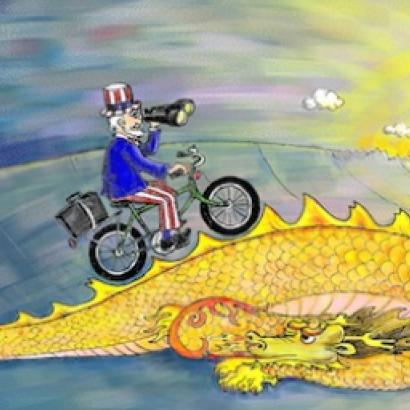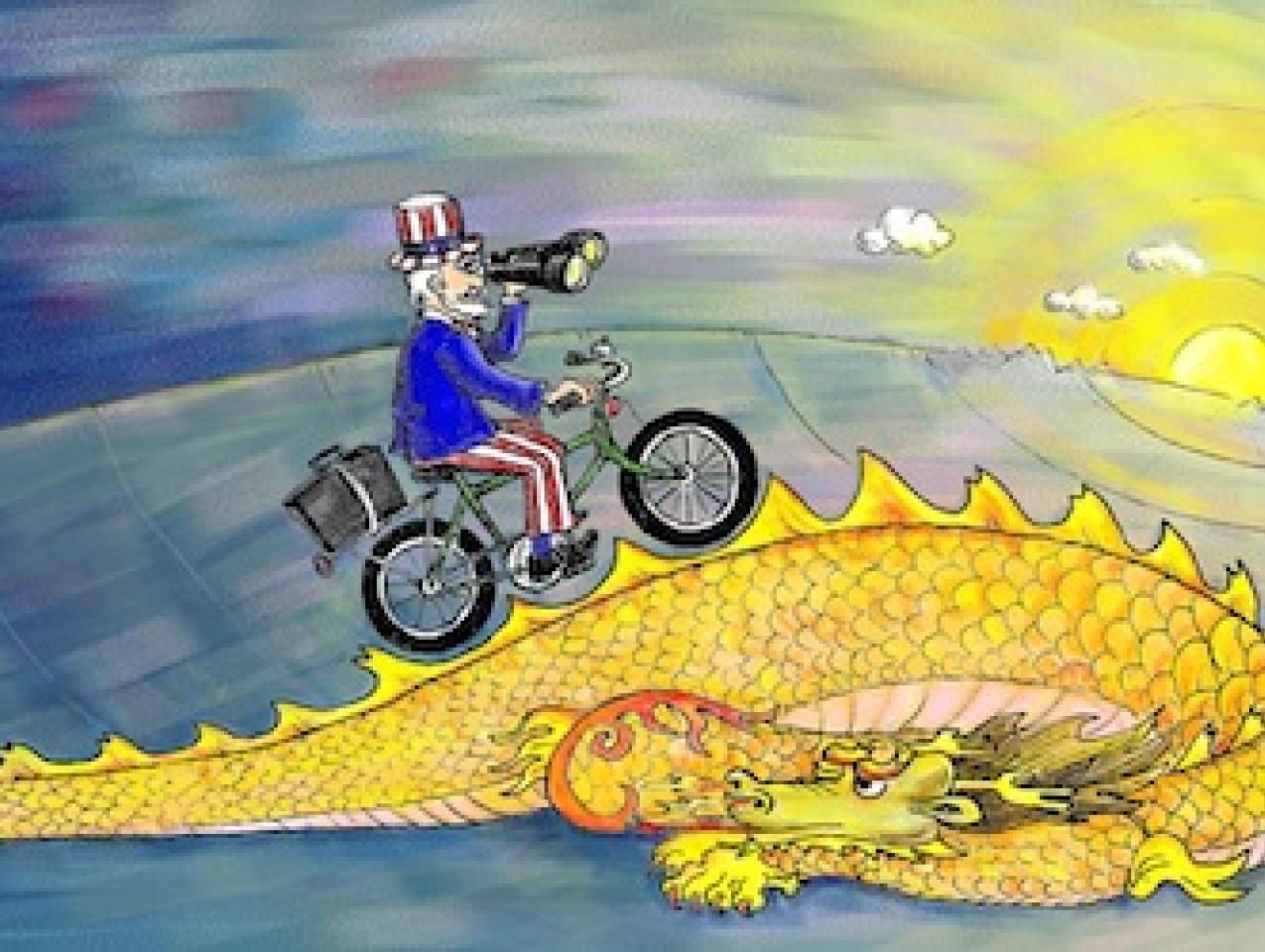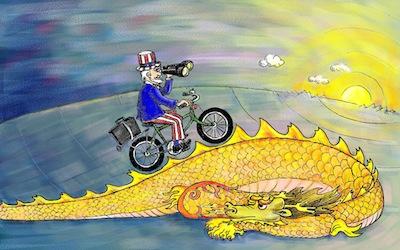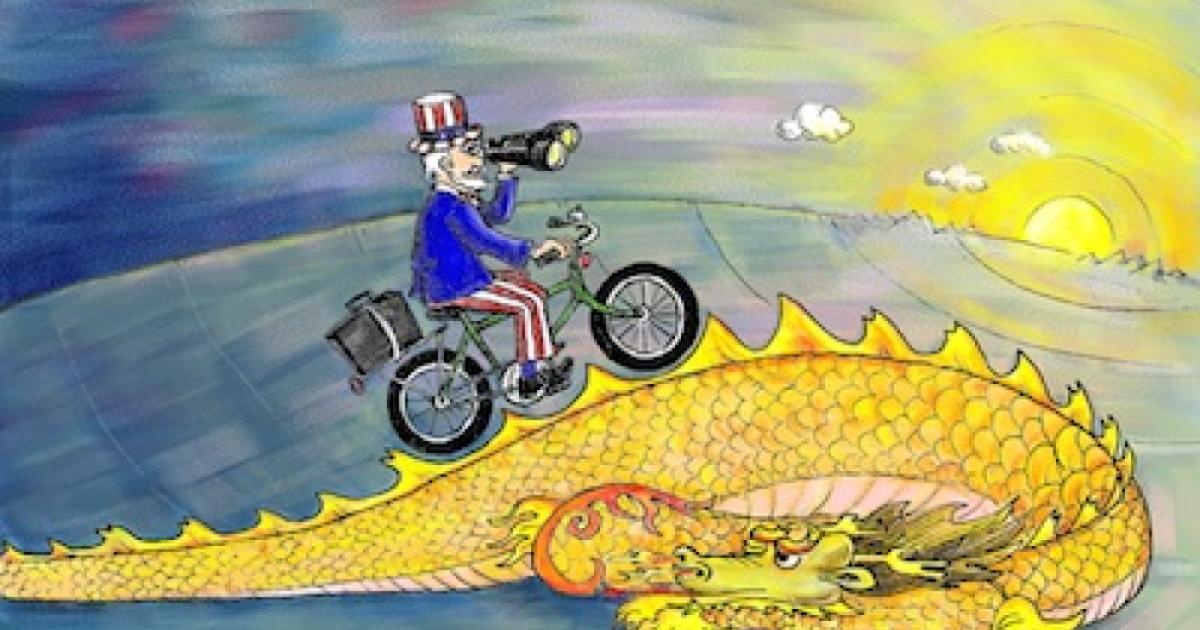- Economics
- International Affairs
- US Foreign Policy
- Law & Policy
- Regulation & Property Rights
Since the financial crisis of 2008, leftwing politicians, pundits, and activists in America have been busy either fawning all over or despairing about China. Repeatedly, they have lauded Beijing’s ability to undertake grand projects far more quickly than Washington’s political gridlock would ever allow. From New York Times columnist Thomas Friedman to trade unionist Andy Stern to President Barack Obama, prominent Americans on the political left cannot stop using the example of China to advocate the need to drastically increase the size of the U.S. government and spend big on liberal priorities.
Yet another group of Americans, one far less interested in transforming the United States into a European welfare state, have been no less gushing in their praise of Chinese authoritarian chic. This group consists of business executives who are far more familiar with the workings of the free market than they are with the dogma of liberal ideology, and are driven first and foremost by the profit motive than big-government worship. Their China enthusiasm, however flawed, sheds light on America’s economic weaknesses and deserves attention.
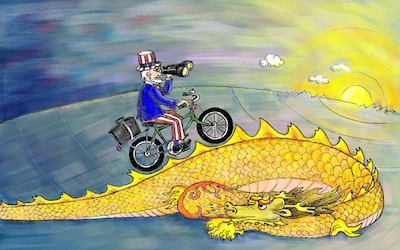
Illustration by Barbara Kelley
In recent years, business leaders have increasingly described the Chinese state as a paragon of efficiency. Frequently, they marvel at the rapid pace with which jobs are created, contracts are signed, and infrastructure is built.
Writing in The Wall Street Journal last July, retired Microsoft COO Robert Herbold pointed to China’s infrastructure prowess, fiscal soundness, and government-created, five-year economic plans, and concluded that the United States is clearly losing to China in the game of global economic competitiveness. He reminded Americans that they need to make “big changes” to get back on track. These changes include fixing the budget and the burden of entitlements, implementing an aggressive five-year debt-reduction plan, and moving beyond political gridlock to approve “some winning plans.”
Herbold’s assessment would likely resonate with Coca Cola Chief Executive Muhtar Kent, who believes that in many respects, the United States is a less friendly place to do business compared to China. Speaking to the Financial Times in September 2011, Kent noted that America’s political gridlock creates an environment of business uncertainty, while the tax structure imposes antiquated disadvantages on U.S. multinational corporations. Specifically, Kent criticized the U.S. government for taxing American multinational corporations when they repatriate cash earned overseas, while China and numerous other countries do not impose the same burden on their home companies.
American business leaders see China as the paragon of efficiency.
Much of the U.S. business community’s lavish praise of China is over the top and undeserved, but that does not necessarily make their criticisms of the United States wrongheaded. Parsing out what makes sense and what does not would be useful for assessing America’s strengths and weaknesses vis-à-vis China.
Historically, the business community has served as perhaps the most eager advocate of the U.S.-China relationship, trumpeting China’s mouth-watering economic growth potential and the accompanying benefits for the U.S. economy. Yet U.S. businessmen have often been willfully ignorant of China’s economic and political shortcomings.
On the political front, business executives will almost never openly discuss China’s political oppression for fear that they will stoke the wrath of Beijing and suffer financial repercussions. In China, gruesome human rights abuses occur alongside the country’s glitzy economic modernization, but the U.S. business community prefers to emphasize that trade and business with the outside world has made China a more open, more liberal society.
To be sure, U.S. businessmen make a valid point. Over the past three decades, Chinese citizens have increasingly shaken off the state’s control of their most basic daily activities, such as finding a job, choosing a place to live, and deciding what to wear or with whom to be friends. These changes may not constitute political reform, but they have unmistakably made China a better place. China’s economic transformation, in which U.S. businesses have actively participated, has pushed along many of these revolutionary social changes.
Additionally, running a company is not—and should not be confused with—leading a human rights campaign. However maligned the private sector may be by President Obama, there is intrinsic value in the marketplace’s focus on the bottom line, both in America and in China. One cannot expect U.S. businessmen to ignore their duty to shareholders and serve as mouthpieces for human rights causes. With that said, the frequency with which top Western executives effusively praise Chinese rulers for their “astute” and visionary leadership shows an unfortunate obsequiousness, not just a recognition of the tradeoffs necessary to do business with a police state.
Running a company should not be confused with leading a human rights campaign.
On the economic front, business executives have also erred in their rosy pronouncements. Many who lead large multinational corporations often fail to acknowledge the massive inefficiencies and drastic human costs created by China’s state capitalism. For example, much like President Obama and his liberal allies, business leaders have consistently touted China’s infrastructure prowess and Beijing’s ability to plan and direct economic activity.
In fact, nothing has muddied China’s infrastructure narrative more than the disasters in its high-speed railway system. Once, the rapid construction of this system, the most extensive in the world, served as Exhibit A of China’s infrastructure superiority over America. However, going high-speed in China has highlighted endemic corruption and delivered grave tragedy. In February 2011, Liu Zhijun, China’s minister of railways and the architect of the country’s high-speed rail network, was fired and arrested amid accusations of wheeling and dealing in bribes of $155 million—and keeping eighteen mistresses. Then on July 23, one high-speed train rammed into another in southeast China, killing forty and injuring more than 170 passengers. This is hardly an infrastructure model that the United States should follow.
Meanwhile, the Chinese government has offered clear evidence that state planning does not necessarily result in a winning investment. According to a report issued in April 2011 by the Unirule Institute of Economics, an independent think tank in Beijing, the average return on equity of state-owned industrial enterprises in China was much lower than that of their non-state counterparts between 2001 and 2009. When preferential government subsidies (such as free land and cheap loans) for the state firms are factored in, the real return on equity registers at an embarrassing -1.47 percent..
Moreover, 70 percent of all net profits made by China’s centrally-owned enterprises in 2009 came from a mere 10 companies that had been bestowed heavy market advantages by the state. These companies include large oil and gas companies and telecommunications giants. Indeed, Unirule reports that the combined profits of just two of these companies, China Petroleum & Chemical Corporation and China Mobile, exceeded one third of the total profit made by China’s centrally-owned enterprises in 2009.
The unflattering flipside is that a vast majority of China’s remaining state-owned companies (SOEs) are poorly managed or suffer from over-capacity. The grand prize of the poorest performing SOEs in the country goes to many local ones, which are plagued by bad management, cronyism, and corruption enabled by unseemly ties to local government officials. As one Shanghai-based U.S. businessman who regularly works with SOEs has observed, even when Beijing sees these companies floundering and wishes to make improvements, it faces serious obstacles.
Furthermore, serious problems lurk beneath China’s penchant for massive spending. To battle the global financial crisis that began in 2008, Beijing pushed out a $586 billion stimulus package and allocated 45 percent of the funds for infrastructure. Simultaneously, Beijing unleashed a torrent of lending by its state banks. In 2009 and 2010, the banks issued $2.7 trillion in new loans. Today, Beijing is staring at piles of bad debt that affects China’s broader financial health.
Much of the problem stems from the fact that China’s local governments turned out to be some of the most avid consumers of state lending. Though facing legal constraints on borrowing from state banks, they created financing vehicles to serve as intermediaries, incurring off-the-books liabilities and using the funds largely for infrastructure projects that they could not afford.
China's state-owned companies are poorly managed and suffer from over-capacity.
In July of last year, Moody’s Investor Services estimated that China’s local government debt totaled over 14 trillion yuan ($2.17 trillion), more than 35 percent of the country’s 2010 GDP. According to political scientist Victor Shih of Northwestern University, total local governmental debt in China, by various government estimates, are far worse: They range between $2.4 trillion and $3.1 trillion, with the latter amounting to more than 50 percent of China’s 2010 GDP.
These and other economic and financial problems in China hardly paint a picture of a country that is a paragon of efficiency. Instead, they give foreign businessmen a good reason to be less effusive with their praise. Nevertheless, U.S. executives, even if not totally right about China, offer a potent reminder that the U.S. government has saddled its economy with cumbersome regulations and suffers from a myriad of hurdles that hinder growth and free enterprise.
As many in the business community know, doing business in China is chock full of obstacles. While the Chinese rulers, for the most part, welcome money, technology, and expertise from Western businesses, they also facilitate—or fail to act against—rampant theft of foreign intellectual property. The government actively serves as a partial regulator of the marketplace that favors the state sector. Since the financial crisis, foreign businessmen in China have also increasingly complained about the rise of protectionism there.
Yet even top Communist officials believe, as the late Deng Xiaoping once declared, that “to get rich is glorious.” The Chinese government places a single-minded focus on promoting economic growth and sees facilitating capitalism, however crony in nature, as an integral part of the process. Meanwhile, in the United States, President Barack Obama regularly denigrates wealth creation and has spent the last three years of his term in the White House waging class warfare, maligning bankers and financiers, putting forth proposals to tax the rich to fund his big-government initiatives, and erecting regulatory hurdles to business.
President Obama and his congressional Democratic allies have repeatedly delivered what the business community widely perceives as encroachments on free enterprise. A survey conducted by the U.S. Chamber of Commerce indicates that more than 80 percent of its small business members are very concerned about the prospect of new regulations, mandates, and higher taxes in the United States, and believe these developments will likely provide disincentives for new hiring.
In his 2012 address on “The State of American Business,” Thomas Donohue, President and CEO of the Chamber, noted that under Obama, the “regulatory avalanche confronting our job creators is unprecedented.” The list of examples is long: “The Labor Department has 100 rulemakings in the pipeline. Dodd-Frank requires 447 rules, 63 reports, and 59 studies. The health care law established 159 new agencies, panels, commissions, and regulatory bodies. EPA has some 200 regulations in the works.”
In light of the mounting hurdles to free enterprise in the American marketplace, China’s eagerness to promote business and create jobs naturally appears quite impressive to the U.S. business community. This is an unfortunate reality with which American policymakers must wrestle. Meeting the challenge of China’s political and economic rise requires seeing its limitations clearly. But it also demands that America’s political leaders take the necessary steps to make their own economy more competitive, more agile, and friendlier to the free market. In that vein, doing what many U.S. business leaders advocate—fixing the budget, lowering the burden of entitlements, implementing a sound debt-reduction plan, taking away disincentives for businesses to repatriate earnings from overseas, and reducing regulatory red tape—would be a good start.
Note that the essence of the praise for China’s state capitalism is how well it has worked in moving China away from their model of government control of the economy. In turn they wish to move the US toward more control of the economy in order to emulate China’s move away from it.
---Willis Cook








